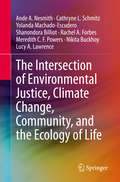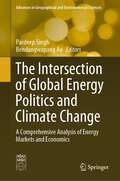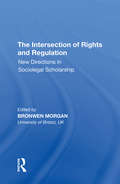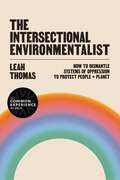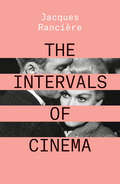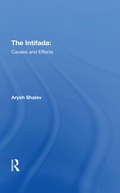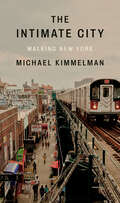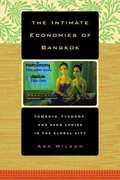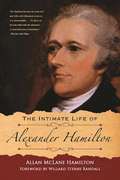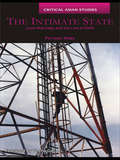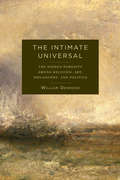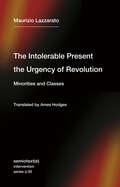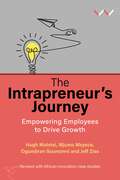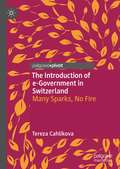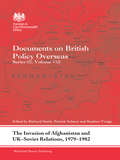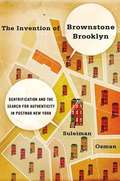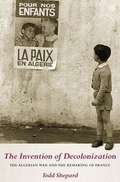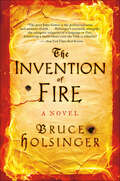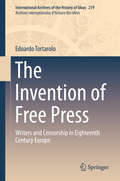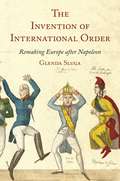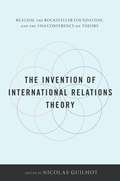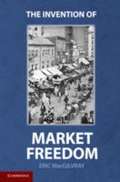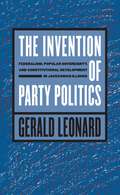- Table View
- List View
The Intersection of Environmental Justice, Climate Change, Community, and the Ecology of Life
by Cathryne L. Schmitz Ande A. Nesmith Yolanda Machado-Escudero Shanondora Billiot Rachel A. Forbes Meredith C. Powers Nikita Buckhoy Lucy A. LawrenceThis book examines and encourages the increasing involvement of those in the social sciences, including social work, as well as everyday citizens, with environmental injustices that affect the natural ecology, community health, and physical and mental health of marginalized communities. The authors draw on their diverse experiences in research, practice, and education to suggest interdisciplinary strategies for addressing environmental justice, climate change, and ecological destruction on both a local and global scale. This insightful work presents models for action, practice, and education, including field learning, with examples of how programs and schools have integrated and infused environmental justice content across their curricula. Environmental and ecological impacts on local communities as well as the whole ecology of life are examined. Models for engaging civic dialogue, addressing structural oppression, and employing other interdisciplinary responses to environmental injustices are provided.Topics explored among the chapters include:Water, Air, and Land: The Foundation for Life, Food, and SocietyHuman Health and Well-Being in Times of Global Environmental Crisis Power and Politics: Protection, Rebuilding, and JusticePathways to Change: Community and Environmental TransformationDecolonizing Nature: The Potential of Nature to HealThe Intersection of Environmental Justice, Climate Change, Community, and the Ecology of Life equips readers to identify the impact of the global environmental crisis in their own communities. Emphasizing the need for immediate action on ecological, climate, and environmental justice issues, this forward-thinking book assists social science professionals, educators, researchers, and other concerned individuals with the knowledge needed for creating meaningful interdisciplinary responses in their communities as they take action within a rapidly changing context.
The Intersection of Global Energy Politics and Climate Change: A Comprehensive Analysis of Energy Markets and Economics (Advances in Geographical and Environmental Sciences)
by Pardeep Singh Bendangwapang AoThis book provides an analysis of the concurrence of energy politics and global climate change. The book starts with an explanation of what roles energy and climate change play in the correlation process and the anthropogenic activities that hamper the smooth functioning of their co-existence. The next part discusses the institutions and industries directly related to energy and climate change. The third part focuses on energy economics and markets to understand the global drivers for economic development. After that, the book presents the world's energy demand due to globalization and the environmental cost involved, followed by the part highlighting the importance of energy transitions and the extent to which the global political set-up is engaged in catering to those transitions. The sixth part of the book takes a comprehensive view of climate change mitigation strategies and carbon and ecological footprints, followed by discussions of future scenarios for building a sustainable framework and forecasts of the resulting political and economic trends. Finally, the last part deals with the challenges faced during the convergence of energy politics and climate change. The book is a valuable resource for early career researchers, university teachers, and professionals in think tanks.
The Intersection of Rights and Regulation: New Directions in Sociolegal Scholarship (Markets And The Law Ser.)
by Bronwen MorganPolicy makers and social actors increasingly face inter-related and inter-penetrated levels and realms of governance. The effect is that some of the intuitive contrasts between rights and regulation are no longer tenable. As the essays collected in this volume show, different combinations of rights and regulatory claims serve as barometers of current changes in political economy. These are not only restructuring political space, but also changing the assumed relevance of rights and regulation. Bringing together a range of fresh perspectives on socio-legal scholarship from a variety of disciplines, The Intersection of Rights and Regulations will have worldwide interdisciplinary appeal.
The Intersectional Environmentalist: How to Dismantle Systems of Oppression to Protect People + Planet
by Leah ThomasFrom the 2022 TIME100 Next honoree and the activist who coined the term comes a primer on intersectional environmentalism for the next generation of activists looking to create meaningful, inclusive, and sustainable change. The Intersectional Environmentalist examines the inextricable link between environmentalism, racism, and privilege, and promotes awareness of the fundamental truth that we cannot save the planet without uplifting the voices of its people -- especially those most often unheard. Written by Leah Thomas, a prominent voice in the field and the activist who coined the term "Intersectional Environmentalism," this book is simultaneously a call to action, a guide to instigating change for all, and a pledge to work towards the empowerment of all people and the betterment of the planet. Thomas shows how not only are Black, Indigenous and people of color unequally and unfairly impacted by environmental injustices, but she argues that the fight for the planet lies in tandem to the fight for civil rights; and in fact, that one cannot exist without the other. An essential read, this book addresses the most pressing issues that the people and our planet face, examines and dismantles privilege, and looks to the future as the voice of a movement that will define a generation.
The Intervals of Cinema
by John Howe Jacques RanciereCinema, like language, can be said to exist as a system of differences. In his latest book, acclaimed philosopher Jacques Rancière looks at cinematic art in comparison to its corollary forms in literature and theatre. From literature, he argues, cinema takes its narrative conventions, while at the same time effacing literature's images and philosophy; and film rejects theatre, while also fulfilling theatre's dream. Built on these contradictions, the cinema is the real, material space in which one is moved by the spectacle of shadows. Thus, for Rancière, film is the perpetually disappointed dream of a language of images.From the Trade Paperback edition.
The Intifada: Causes And Effects
by Aryeh ShalevThe purpose of this study is to analyze the uprising in the Territories of the Israel and the Palestinians and to assess its ramifications for the future. The study examines an alternative to the use of military force by Israel—by opening of negotiations between Israel and the Palestinians.
The Intimate City: Walking New York
by Michael KimmelmanFrom the New York Times architecture critic, his celebrated walking tours of New York City, now expanded, covering four of the five boroughs and some 540 million years of history, accompanied by some of the people who know it bestAs New York came to a halt with COVID, Michael Kimmelman composed an email to a group of architects, historians, writers, and friends, inviting them to take a walk. Wherever they liked, he wrote—preferably someplace meaningful to them, someplace that illuminated the city and what they loved about it. At first, the goal was distraction. At a scary moment when everything seemed uncertain, walking around New York served as a reminder of all the ways the city was still a rock, joy, and inspiration. What began with a lighthearted trip to explore Broadway&’s shuttered theater district and a stroll along Museum Mile when the museums were closed soon took on a much larger meaning and ambition. These intimate, funny, richly detailed conversations between Kimmelman and his companions became anchors for millions of Times readers during the pandemic. The walks unpacked the essence of urban life and its social fabric—the history, plans, laws, feats of structural engineering, architectural highlights, and everyday realities that make up a place Kimmelman calls &“humanity&’s greatest achievement.&” Filled with stunning photographs documenting the city during the era of COVID, The Intimate City is the ultimate insider&’s guide. The book includes new walks through LGBTQ Greenwich Village, through Forest Hills, Queens, and Mott Haven, in the Bronx. All the walks can be walked, or just be read for pleasure, by know-it-all New Yorkers or anyone else. They take readers back to an age when Times Square was still a beaver pond and Yankee Stadium a salt marsh; across the Brooklyn Bridge, for green tea ice cream in Chinatown, for momos and samosas in Jackson Heights, to explore historic Black churches in Harlem and midcentury Mad Men skyscrapers on Park Avenue. A kaleidoscopic portrait of an enduring metropolis, The Intimate City reveals why New York, despite COVID and a long history of other calamities, continues to inspire and to mean so much to those who call it home and to countless others.
The Intimate Economies of Bangkok: Tomboys, Tycoons, and Avon Ladies in the Global City
by Ara WilsonThe Intimate Economies of Bangkok is a multifaceted portrait of the intertwining of identities, relationships, and economics during Bangkok's boom years. Author shows how global economies have interacted with local systems to create new kinds of lifestyles, ranging from "tomboys" to corporate tycoons to sex workers.
The Intimate Life of Alexander Hamilton: Based Chiefly Upon Original Family Letters And Other Documents, Many Of Which Have Never Been Published
by Willard Sterne Randall Allan Mclane HamiltonThe life of Alexander Hamilton is certainly one of great complexity and controversy and, as a result, has been of great interest to the general public for centuries. In the past two hundred years, there have been many accounts of Hamilton's life-mostly commenting on his political personality rather than his character, but none have touched upon the private life of the man quite like The Intimate Life of Alexander Hamilton.Drawn chiefly from collected original family letters and documents, some never published before this book's initial publication in 1910, Hamilton's grandson Allan McLane Hamilton presents a portrait of one of America's chief founding fathers unlike any other, recounting the life of his grandfather with an unmatchable insider's eye. The author intimately discusses his grandfather's private affairs in great detail, dispelling many rumors about Hamilton's personal life. The book presents an astounding portrait of the man and his character, revealing a softness and charisma unknown to the public at the time of its publication. From primary sources so close to Hamilton they could very well be called heirlooms, Hamilton's private life and personality are described with a closeness only a member of his family could possibly provide.Return to this forgotten classic, and see what one of America's most controversial historical figures was like behind closed doors in The Intimate Life of Alexander Hamilton.
The Intimate State: Love-Marriage and the Law in Delhi (Critical Asian Studies)
by Perveez ModyThis book provides an ethnography of love-marriages in the late 1990s in Delhi, identifying the ways in which marriage is ever more a pitch of intense political contestation. It bears upon anthropological understandings of marriageability, urban morality, gender, kinship and the study of the individual and the couple in contemporary India.
The Intimate Universal: The Hidden Porosity Among Religion, Art, Philosophy, and Politics (Insurrections: Critical Studies in Religion, Politics, and Culture)
by William DesmondWilliam Desmond sees religion, art, philosophy, and politics as essential and distinctive modes of human practice, manifestations of an intimate universality that illuminates individual and social being. They are also surprisingly permeable phenomena, and by observing their relations, Desmond captures notes of a clandestine conversation that transforms ontology.
The Intimidation Game: How the Left Is Silencing Free Speech
by Kimberley StrasselFrom Kim Strassel-one of the preeminent political columnists writing today and member of the Wall Street Journal editorial board-comes an insightful, alarming look at how the Left, once the champion of civil liberties, is today orchestrating a coordinated campaign to bully Americans out of free speech. For nearly 40 years, Washington and much of the American public have held up disclosure and campaign finance laws as ideals, and the path to cleaner and freer elections. This book will show, through first-hand accounts, how both have been hijacked by the Left as weapons against free speech and free association, becoming the most powerful tools of those intent on silencing their political opposition. THE INTIMIDATION GAME provides a chilling expose of political scare tactics and overreach, including:How Citizens United set off a wave of liberal harassment against conservative politiciansThe targeting of Tea Party groups by the IRSHow Wisconsin prosecutors, state AGs, and a Democratic Congress shut down political activists and businessesThe politicization by the Obama administration of a host of government agencies including the FEC, FCC and the SECTimed to arrive at the height of the 2016 presidential season, THE INTIMIDATION GAME will shine a much-needed light on how liberal governance and the Democratic machine bullies the political process.
The Intolerable Present, the Urgency of Revolution: Minorities and Classes
by Maurizio LazzaratoAn acute reappraisal for our time of the very concept of revolution.In order to be effective, union struggles, struggles for national liberation, worker mutualism, or struggles for emancipation were strategies that were necessarily connected to revolution. Starting from the historic defeat of the global Revolution in the mid-1970s, this book draws a portrait—whose elaboration is still lacking—of the concept of revolution. What conditions could lead us to speak of revolution once again?In The Intolerable Present, the Urgency of Revolution, Maurizio Lazzarato ponders the fundamental importance of the passage from the historical class struggle (the conflict between capital and labor) to the more recent class struggles that open onto plural trajectories: social, sexual, gender, and race struggles. Expanding the notion of class as a rejoinder to the normative appropriation of minority politics, the revolution is returned as the horizon where subjection can be resorbed.In this sense, Marxist, feminist, anticolonial, and postcolonial theories provide the necessary critical tools to understand the relations between classes and minorities, between the global North and the global South, and between the time of revolutions and the eruption of new subjectivities.
The Intrapreneur’s Journey: Empowering Employees to Drive Growth
by Hugh Molotsi Mjumo Mzyece Ogundiran Soumonni Jeff ZiasAn essential business guide on how to develop an organization's innovation culture and internal entrepreneurs (intrapreneurs)The Intrapreneur’s Journey: Empowering Employees to Drive Growth is an essential guide on effectively creating and implementing a sustainable culture of innovation and entrepreneurship within organizations. The book is based on the insight that established organizations see continuous delivery of innovative products, services and processes when they enable teams of entrepreneurial employees to think and behave like start-ups.Three qualities make this book unique. First, it explores the theory and practice of intrapreneurship and innovation with a particular, but not exclusive focus on key issues in African contexts. Second, it includes a large, diverse set of instructive examples and case studies of intrapreneurship and innovation in organizations in Africa. And third, it features a useful toolkit: the Intrapreneurship Empowerment Model, a simple yet complete implementation framework. The book includes key resources of practical, real-world tools and assets used by some of the world’s most intrapreneurial and innovative organizations.The Intrapreneur’s Journey adds value for both practitioners and scholars of intrapreneurship and innovation in Africa and other parts of the world.
The Introduction of e-Government in Switzerland: Many Sparks, No Fire
by Tereza CahlikovaThis book studies the question of e-Government development from a multi-faceted perceptive. The first introductory chapter outlines the importance of public sector digitalisation. The second chapter clarifies the used e-Government terminology and divides the concept between electronic public service delivery and electronic practice of democracy. Influential factors having an impact on the introduction of e-Government projects are divided between those of organisational, institutional, individual and technological nature and discussed in detail in the third chapter. The fourth chapter presents empirical findings from the Swiss case study that constitutes both an exceptional and exemplary model of e-Government development. High quality of public services and the participative style of democracy would seem to predestine the country to be the precursor in the field of e-Government. However, the state of e-Government development does not correspond to the potential that Swiss contextual conditions offer. The importance of the Swiss case study for the understanding of e-Government as an institutional and organisational transformation is outlined in the fifth chapter.
The Invasion of Afghanistan and UK-Soviet Relations, 1979-1982: Documents on British Policy Overseas, Series III, Volume VIII (Whitehall Histories)
by R. A. Smith P. Salmon S. TwiggeThis volume examines British policy towards the Soviet Union in the aftermath of the invasion of Afghanistan in December 1979. The documents in this volume, many released into the public realm for the first time, describe the development of British policy towards the Soviet Union during the eventful years 1979-1982. The new Conservative government, under Margaret Thatcher, was determined to strengthen British defences against the perceived Soviet threat and advocated a strong response to the Soviet intervention. East-West relations further deteriorated following the imposition of martial law in Poland in December 1981. The dilemma facing the British government was how to express strong disapproval of Soviet actions while still attempting to maintain a constructive bilateral relationship, and at the same time keep British policy in line with the Western Alliance. The death of President Brezhnev in November 1982, after 18 years in office, brought uncertainty but also new opportunities for relations with the Soviets. This book will be of much interest to students of British politics and foreign policy, Russian history, US foreign policy, Central Asian politics, and IR in general.
The Invention of Brownstone Brooklyn: Gentrification and the Search for Authenticity in Postwar New York
by Suleiman OsmanThis book describes the gentrification of northwestern Brooklyn from about the 1950s to the 1970s.
The Invention of Decolonization: The Algerian War and the Remaking Of France
by Todd ShepardIn this account of the Algerian War's effect on French political structures and notions of national identity, Todd Shepard asserts that the separation of Algeria from France was truly a revolutionary event with lasting consequences for French social and political life.
The Invention of Fire: A Novel
by Bruce HolsingerThe author of the acclaimed medieval mystery A Burnable Book once again brings fourteenth-century London alive in all its color and detail in this riveting thriller featuring medieval poet and fixer John Gower—a twisty tale rife with intrigue, danger mystery, and murder.Though he is one of England’s most acclaimed intellectuals, John Gower is no stranger to London’s wretched slums and dark corners, and he knows how to trade on the secrets of the kingdom’s most powerful men. When the bodies of sixteen unknown men are found in a privy, the Sheriff of London seeks Gower’s help. The men’s wounds—ragged holes created by an unknown object—are unlike anything the sheriff’s men have ever seen. Tossed into the sewer, the bodies were meant to be found. Gower believes the men may have been used in an experiment—a test for a fearsome new war weapon his informants call the “handgonne,” claiming it will be the “future of death” if its design can be perfected.Propelled by questions of his own, Gower turns to courtier and civil servant Geoffrey Chaucer, who is working on some poems about pilgrims that Gower finds rather vulgar. Chaucer thinks he just may know who commissioned this new weapon, an extremely valuable piece of information that some will pay a high price for—and others will kill to conceal. . .
The Invention of Free Press
by Edoardo TortaroloTracking the relationship between the theory of press control and the realities of practicing daily press censorship prior to publication, this volume on the suppression of dissent in early modern Europe tackles a topic with many elusive and under-researched characteristics. Pre-publication censorship was common in absolutist regimes in Catholic and Protestant countries alike, but how effective it was in practice remains open to debate. The Netherlands and England, where critical content segued into outright lampoonery, were unusual for hard-wired press freedoms that arose, respectively, from a highly competitive publishing industry and highly decentralized political institutions. These nations remained extraordinary exceptions to a rule that, for example in France, did not end until the revolution of 1789. Here, the author's European perspective provides a survey of the varying censorship regulations in European nations, as well as the shifting meanings of 'freedom of the press'. The analysis opens up fascinating insights, afforded by careful reading of primary archival sources, into the reactions of censors confronted with manuscripts by authors seeking permission to publish. Tortarolo sets the opinions on censorship of well-known writers, including Voltaire and Montesquieu, alongside the commentary of anonymous censors, allowing us to revisit some common views of eighteenth-century history. How far did these writers, their reasoning stiffened by Enlightenment values, promote dissident views of absolutist monarchies in Europe, and what insights did governments gain from censors' reports into the social tensions brewing under their rule? These questions will excite dedicated researchers, graduate students, and discerning lay readers alike.
The Invention of Humanity: Equality and Cultural Difference in World History
by Siep StuurmanFor much of history, strangers were seen as barbarians, seldom as fellow human beings. The notion of common humanity had to be invented. Drawing on global thinkers, Siep Stuurman traces ideas of equality and difference across continents and civilizations, from antiquity to present-day debates about human rights and the “clash of civilizations.”
The Invention of International Order: Remaking Europe after Napoleon
by Professor Glenda SlugaThe story of the women, financiers, and other unsung figures who helped to shape the post-Napoleonic global orderIn 1814, after decades of continental conflict, an alliance of European empires captured Paris and exiled Napoleon Bonaparte, defeating French military expansionism and establishing the Concert of Europe. This new coalition planted the seeds for today's international order, wedding the idea of a durable peace to multilateralism, diplomacy, philanthropy, and rights, and making Europe its center. Glenda Sluga reveals how at the end of the Napoleonic wars, new conceptions of the politics between states were the work not only of European statesmen but also of politically ambitious aristocratic and bourgeois men and women who seized the moment at an extraordinary crossroads in history.In this panoramic book, Sluga reinvents the study of international politics, its limitations, and its potential. She offers multifaceted portraits of the leading statesmen of the age, such as Tsar Alexander, Count Metternich, and Viscount Castlereagh, showing how they operated in the context of social networks often presided over by influential women, even as they entrenched politics as a masculine endeavor. In this history, figures such as Madame de Staël and Countess Dorothea Lieven insist on shaping the political transformations underway, while bankers influence economic developments and their families agitate for Jewish rights.Monumental in scope, this groundbreaking book chronicles the European women and men who embraced the promise of a new kind of politics in the aftermath of the Napoleonic wars, and whose often paradoxical contributions to modern diplomacy and international politics still resonate today.
The Invention of International Relations Theory: Realism, the Rockefeller Foundation, and the 1954 Conference on Theory
by Nicolas GuilhotThe 1954 Conference on Theory, sponsored by the Rockefeller Foundation, featured a who's who of scholars and practitioners debating the foundations of international relations theory. Assembling his own team of experts, all of whom have struggled with this legacy, Nicolas Guilhot revisits a seminal event and its odd rejection of scientific rationalism.Far from being a spontaneous development, these essays argue, the emergence of a "realist" approach to international politics, later codified at the conference, was deliberately triggered by the Rockefeller Foundation. The organization was an early advocate of scholars who opposed the idea of a "science" of politics, pursuing, for the sake of disciplinary autonomy, a vision of politics as a prerational and existential dimension that could not be "solved" by scientific means. As a result, this nascent theory was more a rejection of behavioral social science than the birth of one of its specialized branches. The archived conversations reproduced here, along with unpublished papers by Hans Morgenthau, Reinhold Niebuhr, and Paul Nitze, speak to this defensive stance. International relations theory is critically linked to the context of postwar liberalism, and the contributors explore how these origins have played out in political thought and American foreign policy.
The Invention of Market Freedom
by Eric MacgilvrayHow did the value of freedom become so closely associated with the institution of the market? Why did the idea of market freedom hold so little appeal before the modern period and how can we explain its rise to dominance? In The Invention of Market Freedom, Eric MacGilvray addresses these questions by contrasting the market conception of freedom with the republican view that it displaced. After analyzing the ethical core and exploring the conceptual complexity of republican freedom, MacGilvray shows how this way of thinking was confronted with, altered in response to, and finally overcome by the rise of modern market societies. By learning to see market freedom as something that was invented, we can become more alert to the ways in which the appeal to freedom shapes and distorts our thinking about politics.
The Invention of Party Politics
by Gerald LeonardThis ambitious work uncovers the constitutional foundations of that most essential institution of modern democracy, the political party. Taking on Richard Hofstadter's classic The Idea of a Party System, it rejects the standard view that Martin Van Buren and other Jacksonian politicians had the idea of a modern party system in mind when they built the original Democratic party.Grounded in an original retelling of Illinois politics of the 1820s and 1830s, the book also includes chapters that connect the state-level narrative to national history, from the birth of the Constitution to the Dred Scott case. In this reinterpretation, Jacksonian party-builders no longer anticipate twentieth-century political assumptions but draw on eighteenth-century constitutional theory to justify a party division between "the democracy" and "the aristocracy." Illinois is no longer a frontier latecomer to democratic party organization but a laboratory in which politicians use Van Buren's version of the Constitution, states' rights, and popular sovereignty to reeducate a people who had traditionally opposed party organization. The modern two-party system is no longer firmly in place by 1840. Instead, the system remains captive to the constitutional commitments on which the Democrats and Whigs founded themselves, even as the specter of sectional crisis haunts the parties' constitutional visions.
